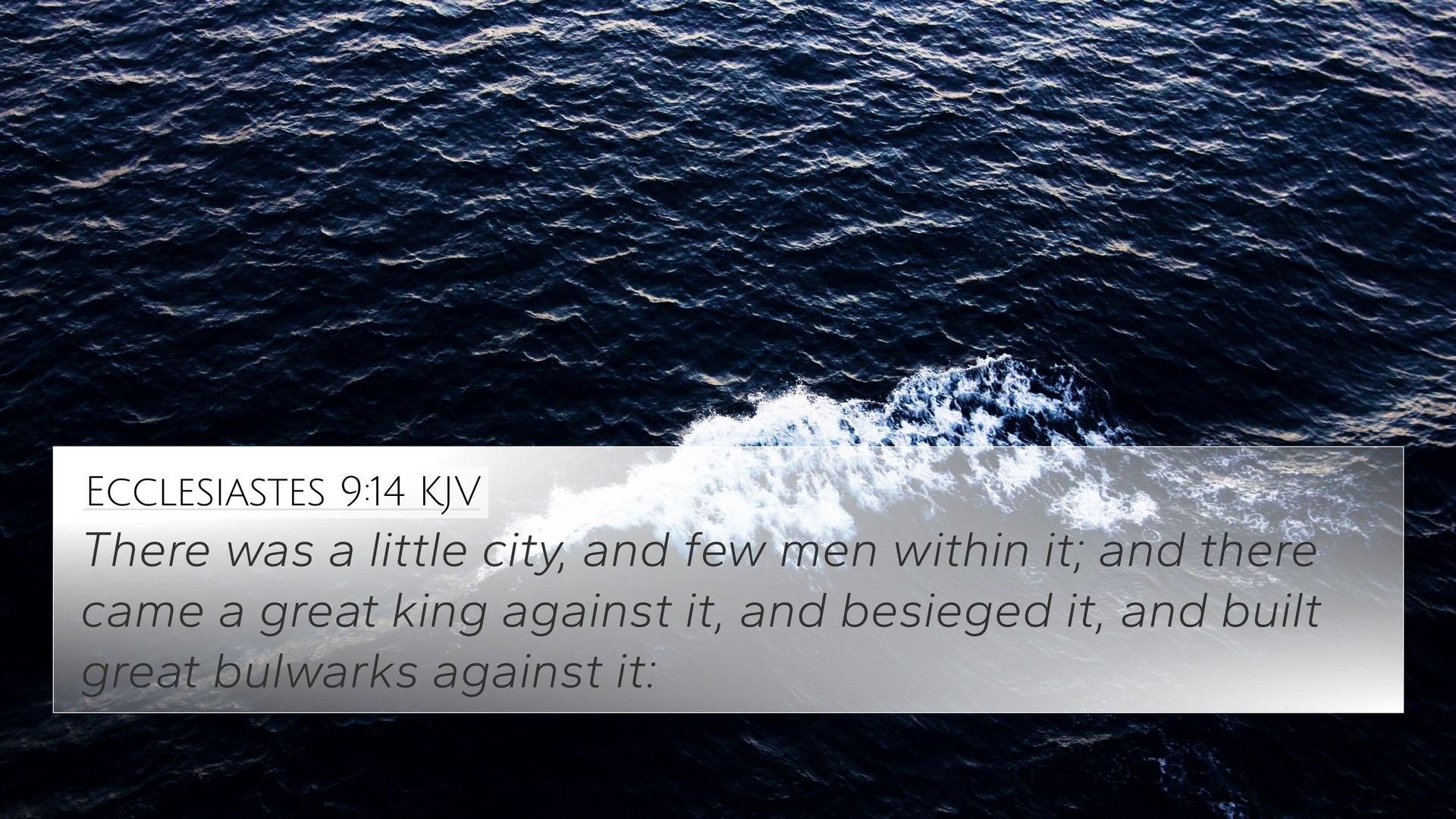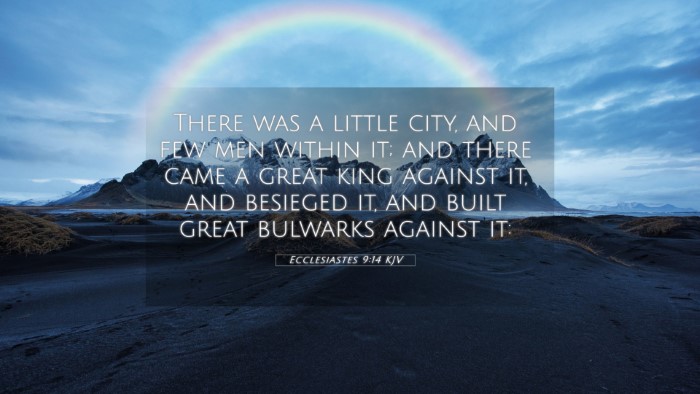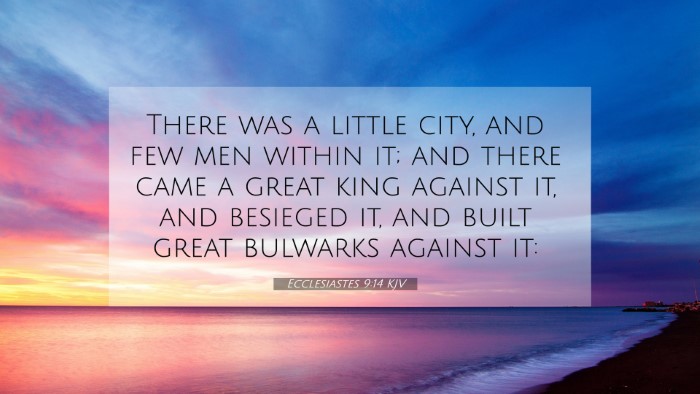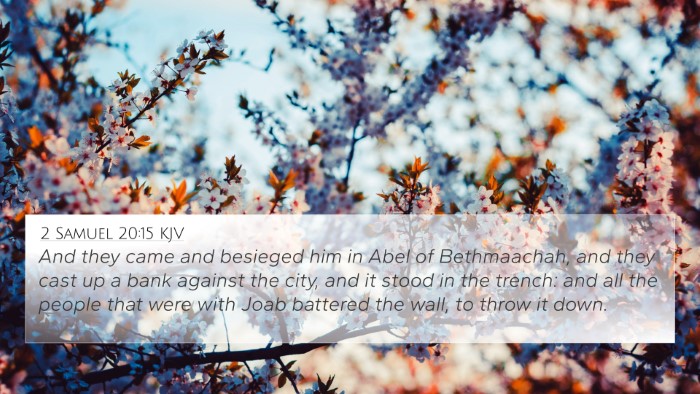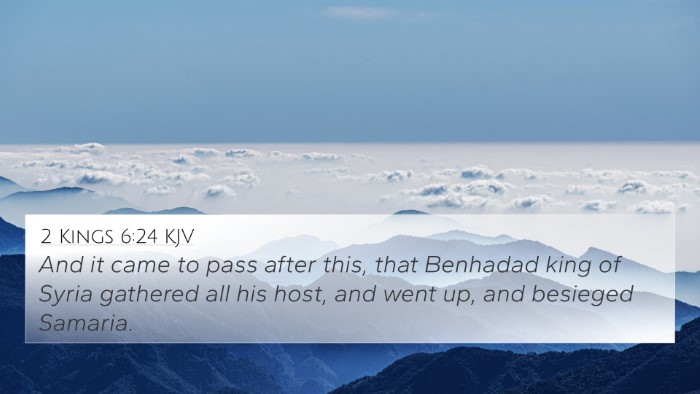Ecclesiastes 9:14 states: “There was a little city, and few men within it; and there came a great king against it, and besieged it, and built great bulwarks against it.”
This verse presents a vivid illustration of a small city under siege, which serves as a metaphor for vulnerability and the relentless power of external forces. The imagery evokes themes of desperation, protection, and the harsh realities of life.
Meaning and Interpretation
-
Connotations of the City:
The 'little city' represents a multitude of aspects: it can symbolize an individual, a community, or even the state of humanity as a whole. Henry notes the insignificance of the city contrasted with the formidable power of the king, highlighting how smallness and vulnerability can lead to dire circumstances.
-
The Siege as a Metaphor:
The siege by a 'great king' indicates overwhelming adversity. Adam Clarke comments on how this reflects the challenges we face in life—often, we confront powerful adversaries that seem insurmountable. The great bulwarks indicate extensive preparations made against this city, emphasizing the seriousness and intensity of the threat.
-
Lessons of Wisdom and Strength:
Albert Barnes points out that even in the face of overwhelming adversity, this verse teaches us about the importance of wisdom and strategy in overcoming challenges. The city, although small, gives an opportunity to reflect on resilience. The strong opposition also symbolizes life’s larger existential challenges faced by individuals.
Cross-References
Ecclesiastes 9:14 resonates with several other Bible verses that illuminate its themes of struggle, wisdom, and divine providence. Here are some relevant cross-references:
- Proverbs 21:22: "A wise man scaleth the city of the mighty, and casteth down the strength of the confidence thereof." This verse deepens the theme of wisdom in confronting powerful adversaries.
- 2 Chronicles 20:17: "Ye shall not need to fight in this battle: set yourselves, stand ye still, and see the salvation of the LORD with you." Here, it's made clear that divine intervention can prevail over worldly powers.
- Psalms 127:1: "Except the LORD build the house, they labor in vain that build it." This verse reminds us of the futility of human efforts without divine assistance, akin to the city under siege.
- Matthew 5:14: "Ye are the light of the world. A city that is set on a hill cannot be hid." This verse contrasts the small city with the strength of a city built upon principles of higher wisdom and purpose.
- Romans 8:31: "What shall we then say to these things? If God be for us, who can be against us?" This underscores the idea that with God's backing, even the smallest can overcome the greatest of challenges.
- 1 Corinthians 1:27: "But God hath chosen the foolish things of the world to confound the wise; and God hath chosen the weak things of the world to confound the things which are mighty." This connects with the city’s vulnerability revealing God’s strength in weakness.
- Hebrews 11:30: "By faith the walls of Jericho fell down, after they were compassed about seven days." This illustrates that faith can indeed overcome overwhelming physical adversities.
Thematic Connections
The themes presented in Ecclesiastes 9:14 can also be explored through an inter-Biblical dialogue that highlights the continuity of thought throughout scripture. The portrayal of the 'little city' reflects a recurring motif of God’s faithfulness amidst adversity.
-
Vulnerability and Strength:
The tension between vulnerability and strength is a common biblical theme, seen in verses like 2 Corinthians 12:9, where Paul writes about weakness being a vessel for strength through God's grace.
-
Overcoming Adversities:
The narrative of Gideon in Judges 7 resonates with the small city theme, where God uses a few against many to denote His power over seemingly impossible odds.
-
Divine Sovereignty:
References to God’s sovereignty amid chaos can also complement the message in Ecclesiastes 9:14, echoing verses like Isaiah 54:17, "No weapon that is formed against thee shall prosper."
Conclusion
In summary, Ecclesiastes 9:14 serves as a profound reminder of the vulnerabilities we face as individuals and communities, particularly in the face of overwhelming circumstances. Drawing on the insights from public domain commentaries, it invites us to reflect on our own lives, the wisdom needed to combat adversity, and the providence of God. Through thematic connections and an analytical approach to related scripture, believers can find solace and strength amidst life’s most challenging sieges.
